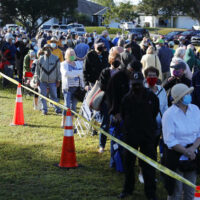Vaccine Delivery – When First Come, First Serve Means People with Disabilities are at the End of the Line.

- When emphasis is placed on the number of persons inoculated with the COVID-19 vaccine, Florida leaves out and neglects those who may require more time and effort to vaccinate
- Those with money, resources and ability jump first in line for the vaccine.
- Financial and physical ability are placed before equity in the vaccine distribution scheme.
Ms. Emily Jackson is 86 years old and lives in Palm Beach County, Florida. She had a knee and hip replacement and cannot stand or wait in lines. She is willing to take an Uber or paratransit to get to the site, but she can’t wait in lines. She also a cancer survivor and believes she is immunocompromised. Ms. Jackson lives with her 88-year-old husband, and both are not that computer literate. Because of COVID-19, she has not been to a grocery store or a pharmacy for the past year. As with the vast majority of seniors with disabilities, Ms. Jackson lives independently in her community.
Ms. Jackson is not unique, and a composite of the many persons who have called about the dilemmas that they have in being vaccinated in Florida. As of March 16, 2021, three million out of the 4.5 million people in Florida who are over 65 have been vaccinated. As such, 2/3 of persons over 65 have been vaccinated. Conversely, 1/3 of all persons over 65 in Florida have a disability. (2012 American Community Survey).
When Florida implemented its COVID-19 vaccination plan, and even when the Federal Government came into Florida, they did absolutely no planning relating to the disability related needs of millions of persons with disabilities that live independently in the community. Both planning for and accommodating persons with disabilities is a requirement of both the Americans with Disabilities Act and Section 504 of the Rehabilitation Act. However, having a one-size-fits-all strategy that requires persons to have (1) internet access to set an appointment; (2) a method to travel to and wait in line (or in a car) for a vaccination; (3) travel to a crowded public accommodation (such as a drug store, supermarket, community center or a hospital) while immunocompromised.
In January, Disability Independence Group filed a complaint with the U.S. Department office of Civil Rights regarding this practice. The solution is clear. The accommodations needed are basic:
1) Have options other than a physician’s attestation on a form to otherwise qualify to be immunized as a person with a disability:
a) Publish a list of types of conditions which would entitle a person to be extremely vulnerable to COVID-19
b) Allow the person to present documentation that demonstrates a history of such condition to fulfill the eligibility criteria.
2) Provide a method to request an accommodation, including an email and phone number, as well as information that is not solely computer-based to help register for a vaccination.
3) Provide a fast-pass method to get a vaccine where the line is shorter or requires an appointment for those who cannot stand or wait for long periods of time.
4) Provide a method for immunocompromised people to obtain a vaccine without waiting in line or going into a hospital or vaccination center.
5) Provide paratransit, taxi, or rideshare vouchers to deliver and wait for people while they are vaccinated and monitored reactions, and then return them home.
6) Provide in-home vaccinations for those who cannot leave home or are severely immunocompromised.
After FEMA decided to open up five vaccine distribution centers in Florida, I thought that the Federal Government would use this effort to ensure that other resources of the state could be used to ensure that persons with disabilities were accommodated. On March 9, 2021, DIG, along with others, including Professor Ken Goodman, urged the Governor and FEMA to ensure the ethical distribution of vaccines by ensuring those with disabilities received accommodations and access to the vaccine delivery system. Ltr. to Governor DeSantis (03-11-21).
On March 11, 2021, Governor DeSantis tweeted:
To date, more than 1,500 homebound seniors have been vaccinated by state strike teams. Today, the state is launching a new way for homebound seniors to sign up to have the vaccine come directly to them. Please email HomeboundVaccine@em.myflorida.com to put in your request.
The homebound seniors that were previously provided these benefits by the State were those who were residents of long-term care facilities, Holocaust survivors and Bay of Pigs veterans, and not members of the general population. When you make an inquiry to this email, you are provided a “Homebound Vaccine Request Survey” which includes the following question:
Does the individual have a condition due to an illness or injury that restricts their ability to leave their place of residence except with the aid of: supportive devices (such as crutches, canes, wheelchairs, walkers); or the assistance of another person; or if leaving home is medically contraindicated?
There is no phone number or other information regarding whether someone will contact you or method to respond or provide more information. According to a March 14, 2021 press release on the Pinellas County Department of Health website,
Homebound residents can also let the Florida Department of Emergency Management (FDEM) know they are in need by emailing HomeboundVaccine@em.myflorida.com. FDEM will send them a survey and then work with DOH strike teams to deliver vaccines. FDEM is working on writing up more information for how this program will work and will provide to counties when they complete.
So, as of March 17, 2021, persons with disabilities continue to be part of the last, lost and left behind when it comes to being vaccinated. Furthermore, while the list of those who are eligible to get the vaccine grows, persons with disabilities will continue to be pushed to the back of the line and dying of COVID-19 – while Florida highlights the fact that they are vaccinating more of the population.













